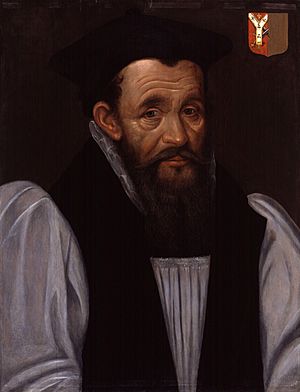Richard Bancroft facts for kids
Quick facts for kids The Most Reverend and Right Honourable Richard Bancroft |
|
|---|---|
| Archbishop of Canterbury | |
 |
|
| Church | Church of England |
| Diocese | Canterbury |
| Enthroned | November 1604 |
| Reign ended | 2 November 1610 |
| Predecessor | John Whitgift |
| Successor | George Abbot |
| Orders | |
| Ordination | 1574 |
| Consecration | 8 May 1597 by John Whitgift |
| Personal details | |
| Born | 1544 Farnworth, Lancashire, England |
| Died | 2 November 1610 (aged 66) Lambeth, Surrey, England |
| Buried | Lambeth |
| Nationality | English |
| Denomination | Anglican |
| Alma mater | Christ's College, Cambridge, Jesus College, Cambridge |
Richard Bancroft (born in 1544 – died in 1610) was an important English church leader. He served as the Archbishop of Canterbury from 1604 until his death in 1610. He was also a main supervisor for the creation of the famous King James Bible.
Contents
Early Life and Education
Richard Bancroft was born in September 1544 in a place called Farnworth, which is now part of Widnes, England. He was the second son of John and Mary Bancroft. His mother's uncle, Hugh Curwen, was also an important church leader, serving as the Archbishop of Dublin.
Richard first went to a local grammar school. In 1563, he became a student at Christ's College, Cambridge. He earned his first degree in 1567. Later, he received a Master of Arts degree in 1570 from Jesus College, Cambridge. He completed his Doctor of Divinity degree in 1585.
He was older than most students when he started college, possibly due to money problems. He was also known to be better at sports than at studying. Around 1564, his uncle Hugh helped him get a special job at St Patrick's Cathedral, Dublin. This job paid him money but did not require much work.
Early Church Career
Richard Bancroft became a priest around 1574. He then worked as a chaplain for Richard Cox, who was the bishop of Ely. In 1575, he became the rector (a type of priest) of Teversham in Cambridgeshire. The next year, he was one of the preachers at the university.
In 1584, he became the rector of St Andrew, Holborn in London. The next year, he was made treasurer of St Paul's Cathedral. In 1586, he joined the ecclesiastical commission. This group helped manage church matters.
On February 9, 1589, he gave a famous sermon at Paul's Cross. In this speech, he strongly criticized the Puritans. Puritans were a group who wanted to make the Church of England simpler. Bancroft said their ideas were dangerous and argued that bishops had a special power from God. Some people, like Sir Francis Knollys, thought his words were a threat to the Queen's power over the church.
Bishop of London
In 1590, Bancroft became a prebendary of St Paul's. He had also been a canon (a type of priest) at Westminster Abbey since 1587. He served as a chaplain to important leaders like Lord Chancellor Hatton and John Whitgift, who was the Archbishop of Canterbury.
In June 1597, Richard Bancroft became the Bishop of London. Because Archbishop Whitgift was getting old and sick, Bancroft took over most of the church's daily business. He was in charge of important cases, including those against "Martin Marprelate" and John Penry. These people were accused of writing things that went against the church or the government. Bancroft made sure their writings were found and given to the Lord Keeper.
In 1600, he was part of a group sent to Emden to solve problems between England and Denmark. However, this mission was not successful. Bancroft was also present when Queen Elizabeth I died.
Archbishop of Canterbury
In March 1604, after Archbishop Whitgift passed away, Richard Bancroft was chosen to lead a special church meeting called a convocation. There, he presented a book of church rules, or canons, that he had put together. These rules were approved by the King. However, the Parliament strongly disagreed with them and set them aside a few months later.
In November of that same year, Bancroft was chosen to be the new Archbishop of Canterbury. He continued to be very strict in his role. He was so successful that some people, like Lord Clarendon, believed he could have stopped all the religious disagreements in England if he had lived longer.
In 1608, he became the chancellor of the University of Oxford. One of his last public actions was to suggest ways to improve the church's money. He also proposed creating a college in Chelsea for studying religious arguments.
In his final months, he helped discuss the consecration of some Scottish bishops. Following his advice, these bishops were consecrated by English bishops. This event helped create the Scottish Episcopal Church. Richard Bancroft was also the main supervisor for the creation of the King James Bible, which is still widely used today. He passed away at Lambeth Palace on November 2, 1610.
Discovery of His Coffin
In 2016, during work on the Garden Museum in London, something amazing was found. The museum is located in the old church of St Mary-at-Lambeth. Workers discovered 30 lead coffins. One of these coffins had a red and gold archbishop's hat on top. A metal plate on this coffin showed that it belonged to Richard Bancroft.
See also
- John Bancroft, his nephew and Master of University College, Oxford
- Hugh Curwen, Archbishop of Dublin 1555 to 1567, Bishop of Oxford 1567 to 1568
 | Bessie Coleman |
 | Spann Watson |
 | Jill E. Brown |
 | Sherman W. White |

